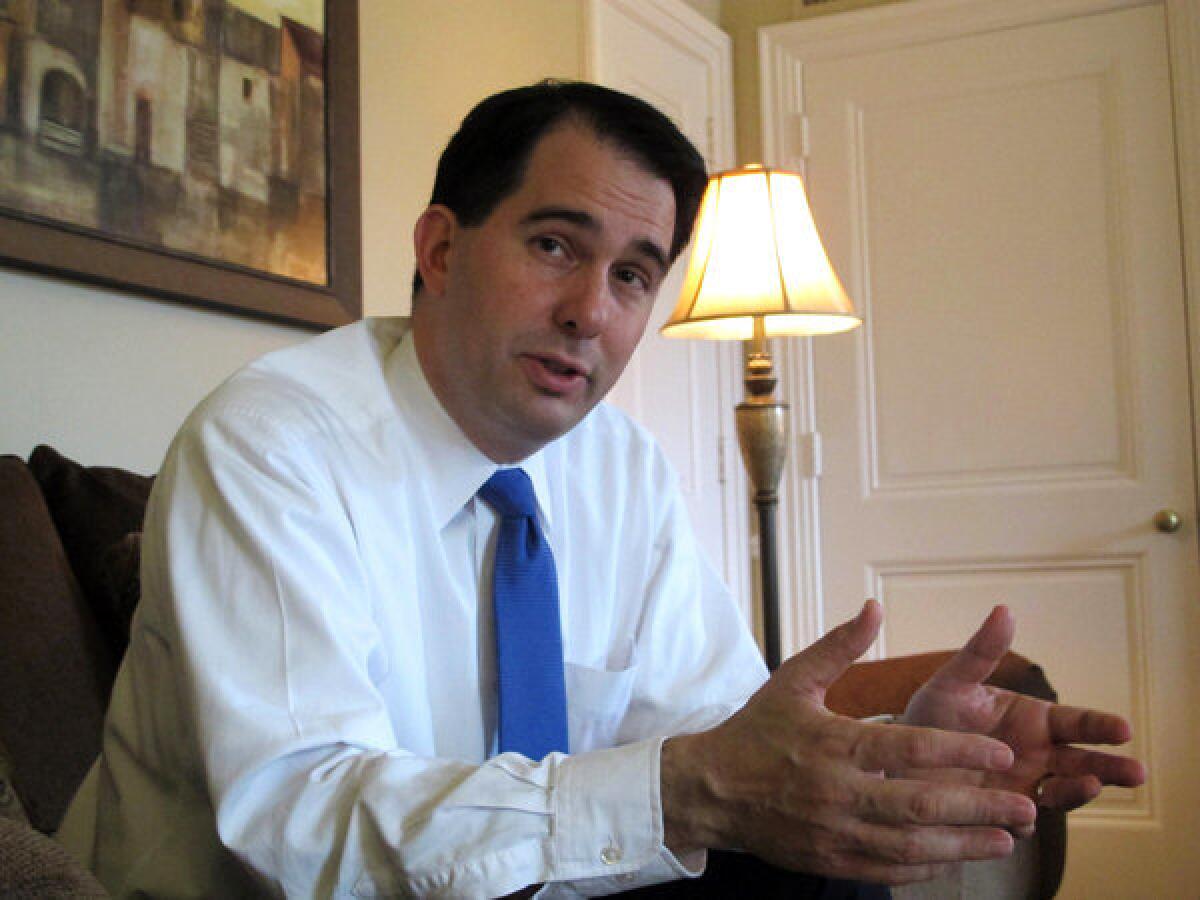Scott Walker: For bold reform, give GOP White House and Congress

- Share via
WASHINGTON — Voters have seen in the last few years that divided government leads to gridlock, and Republicans should make the case in 2014 and 2016 “to give this party a chance” to run both the White House and Congress, Wisconsin Gov. Scott Walker told reporters Friday.
“Instead of sufficient checks and balances,” divided government has delivered “a lot of gridlock,” Walker said at a breakfast hosted by the Christian Science Monitor.
The audition season for the 2016 Republican presidential nomination is already well underway, with potential candidates making speeches in key states, meeting party activists and testing out their message with national political reporters. Walker, who became a hero to many conservatives after picking a huge fight with public employee unions, beating them, then surviving a recall election in 2012, has been testing his message by writing a book, “Unintimidated,” and going on the road ostensibly to sell it.
PHOTOS: 2013’s memorable political moments
The message, which he shares with fellow Gov. Chris Christie of New Jersey, is that voters are looking for a Washington “outsider” who will make “bold promises” and then “have the courage to follow through.”
Republicans cannot succeed as a the “party of no,” he says, and need to offer their own alternatives on topics such as healthcare and the economy.
“A current, reform governor” would be the ideal candidate to make that case in 2016, he said at the press breakfast.
Walker shares that “reform governor” label with Christie, who campaigned for him during the recall and whom he describes as a friend. But unlike the New Jersey governor, who likes to tout his success in dealing with a legislature controlled by Democrats, Walker makes an unabashed pitch for unified, party-controlled government.
“If you want to get big, bold reform done” in Washington or in state government, “you need a team,” he said. Winning the White House “really doesn’t matter as much in ’16 if there isn’t the likelihood that that new president will have a party in charge of both chambers that can help him or her get the job done.”
On a similar note, Walker spoke positively about the decision by Senate Democrats to eliminate filibusters for presidential nominations — at least for executive branch jobs. A chief executive deserves “deference” for his appointees, he said, although he added that a “higher standard” should be required for lifetime appointments to the federal judiciary.
The other major contrast between Walker and Christie is one of style. The Wisconsin governor is several shades more conservative than his New Jersey colleague. But Christie’s public persona centers on a particularly New Jersey style of pugnacity. Walker delivers his message with a careful, low-key tone that belies his willingness to roll the dice on controversial policies, most notably, his successful effort in Wisconsin to all but eliminate collective bargaining for most public-sector employees.
PHOTOS: 2016 presidential possibilities
“I just have a Midwestern filter, that’s the difference,” Walker told a conservative group in Washington on Thursday. “I’m willing to speak out, but I’m not going to call you an idiot. I’m just going to say ‘That’s a ridiculous question,’ and move on.”
He displayed that approach as he repeatedly demurred when reporters at the breakfast pressed him on high-profile social issues, including abortion and same-sex marriage, both of which he opposes. Those are not the issues voters care about, he said.
“As governors, we focus on the things that matter most to people” such as jobs and the economy, he said. “I’m pro-life,” he added, “I don’t apologize about it, but I don’t focus on it.”
A few minutes later, he likened a candidate’s position on abortion to whether an applicant for an executive job at a company was “a Vikings or a Bears fan.”
Walker answered more expansively on another politically touchy issue, immigration. After mentioning his immigrant forebears and slipping in a reference to a Mexican in-law, he said that Washington policymakers were wrong to focus attention now on the problem of the estimated 12 million people in the country illegally. Instead, the top priority should be to greatly increase the number of people who can enter the country legally.
“Fix the front door” first, he said, adding that he did not have “a perfect plan” for a complete overhaul.
Social issues became a major factor in the 2012 election, he said, in part because the GOP primaries involved too many debates, which focused attention on “minute differences” between the candidates and in part because Mitt Romney, the Republican nominee, “didn’t fill the void” by setting out a strong policy agenda on economic issues.
Romney’s campaign focused too much on “I’m not Barack Obama” and not enough on spelling out Republican positions, he said, adding that voters “wanted people who wanted to lead.”
Follow Politics Now on Twitter and Facebook
Twitter: @davidlauter
More to Read
Sign up for Essential California
The most important California stories and recommendations in your inbox every morning.
You may occasionally receive promotional content from the Los Angeles Times.














